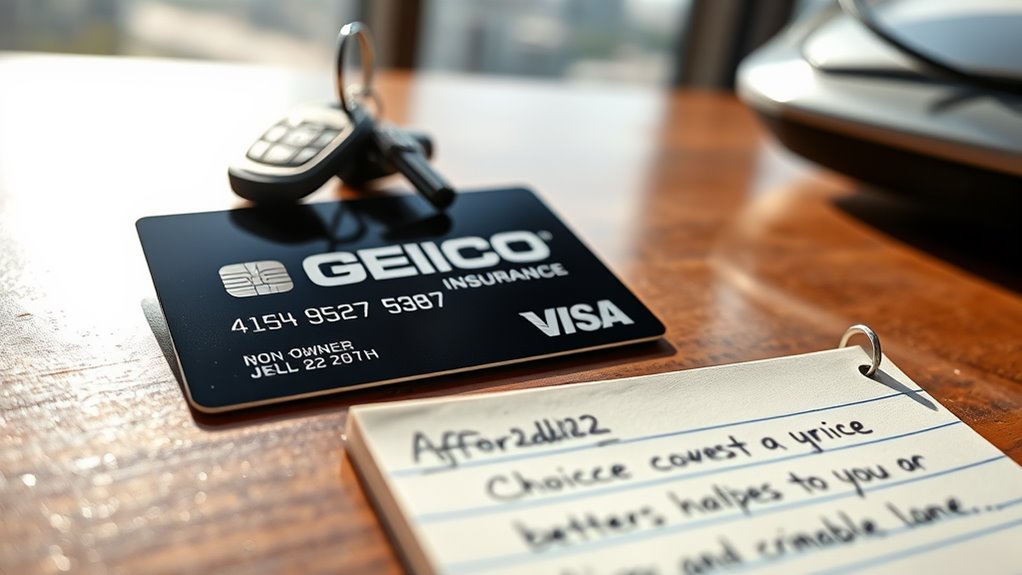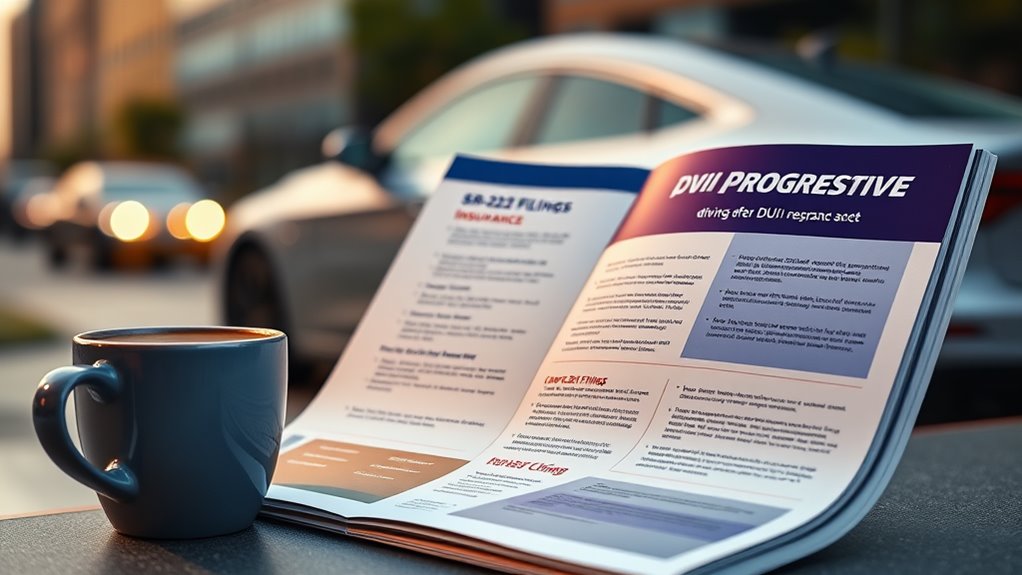Steering through the aftermath of a DUI can be challenging, especially when it comes to securing non-owner insurance. Choosing the right policy is essential, as it can greatly impact your financial stability and driving privileges. Several companies offer tailored coverage options that cater to your specific needs, but not all policies are created equal. Understanding the strengths of each provider can help you make an informed decision about your next steps.
Key Takeaways
- Geico offers affordable non-owner SR-22 coverage at an average rate of $53 monthly, significantly lower than Florida's state average.
- USAA provides competitive rates for eligible military personnel with clean driving records, covering liability while driving others' vehicles.
- State Farm is a reliable choice for non-owner SR-22 insurance, with quick assistance for SR-22 filings and competitive rates.
- Progressive features a streamlined SR-22 filing process, focusing on liability coverage for borrowed or rented vehicles, catering to drivers with serious infractions.
- Dairyland Insurance specializes in non-owner SR-22 policies for high-risk drivers, offering same-day SR-22 filing and optional uninsured/underinsured motorist protection.
Geico: Affordable SR-22 Non-Owner Coverage

When you're in need of non-owner SR-22 insurance, Geico stands out as a cost-effective choice that meets essential state requirements. Their rates average around $53 monthly in Florida, which is 45% lower than the state average, making it a budget-friendly option. Geico's non-owner policies provide only liability coverage, specifically bodily injury and property damage, ensuring you meet minimum financial responsibility standards. While you won't have collision or extensive coverage, this restriction keeps costs down. Additionally, non-owner SR-22 insurance is generally cheaper than typical SR-22 policies, reinforcing Geico's competitive pricing compared to other providers like Progressive and State Farm. It's important to note that maintaining an SR-22 insurance filing is crucial for demonstrating financial responsibility to the state. Remember, you must maintain the SR-22 for approximately three years to comply with state mandates.
USAA: Competitive Rates for Eligible Members
USAA offers competitive rates for eligible members, particularly those with a military background, making it an attractive option for non-owner insurance. Membership includes active-duty military, veterans, and their families, with officers often receiving the best rates due to tiered pricing.
To qualify for these competitive rates, maintaining a clean driving record is essential, although a DUI can lead to stricter requirements. USAA provides non-owner policies that cover liability while driving someone else's vehicle, which can also accommodate SR-22 filings necessary after infractions.
However, keep in mind that these policies typically don't cover damage to the borrowed vehicle. Overall, USAA's combination of competitive pricing and tailored coverage can be beneficial for eligible drivers seeking non-owner insurance.
State Farm: Reliable Non-Owner SR-22 Policies
State Farm provides a reliable option for non-owner SR-22 insurance, particularly beneficial for drivers who need to meet state liability requirements without owning a vehicle.
These policies are tailored for those who frequently rent or borrow cars, ensuring compliance with state regulations. The SR-22 filing certifies that you carry the minimum required liability coverage, often necessary after serious infractions like DUIs.
State Farm offers quick assistance with SR-22 filings, simplifying the process of maintaining your driving privileges. Policies generally include bodily injury and property damage liability coverage, protecting you against third-party claims.
With competitive rates and potential discounts, State Farm stands out as a practical choice for non-owner SR-22 insurance.
Progressive: Quick SR-22 Filings and Coverage Options

For those seeking non-owner SR-22 insurance, Progressive offers a streamlined experience designed specifically for drivers without a personal vehicle.
You'll find that eligibility includes those with serious infractions, such as DUIs. The SR-22 filing process is efficient, as Progressive electronically submits the necessary forms to your state's DMV shortly after you purchase your policy.
Coverage focuses on liability for borrowed or rented vehicles, ensuring you're compliant with state requirements. While the typical filing fee is around $25, overall costs may vary due to increased risk perceptions.
With reliable customer support available via phone, Progressive makes it easier for you to manage your SR-22 requirements and explore additional coverage options tailored to your needs.
Dairyland Insurance: Specialized Non-Owner Policies With SR-22
While maneuvering the complexities of non-owner insurance after a DUI, Dairyland Insurance provides tailored SR-22 policies that meet the unique needs of high-risk drivers.
These non-owner policies offer vital liability coverage for bodily injury and property damage when you drive borrowed vehicles. Dairyland handles the SR-22 filing process electronically, often on the same day you purchase the policy, streamlining your experience.
It's important to maintain continuous coverage to avoid further penalties, especially as a DUI greatly impacts your rates. Additionally, optional coverages like uninsured and underinsured motorist protection can enhance your policy.
Conclusion
Steering through the aftermath of a DUI can feel like steering a ship through stormy seas. Choosing the right non-owner insurance is your anchor, keeping you steady amidst the turbulence. Whether you opt for Geico's affordability or Dairyland's tailored coverage, each option serves as a lifebuoy, helping you stay afloat while you work towards regaining your driving privileges. By evaluating your needs and these top providers, you can chart a course toward safer roads ahead.
